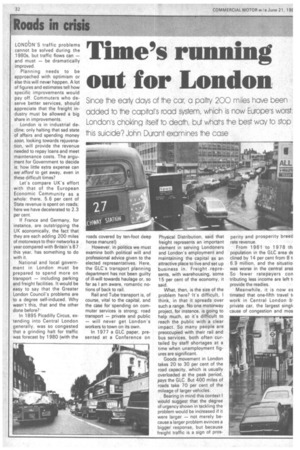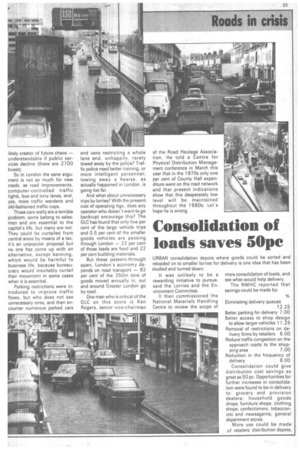Time's running out for London
Page 34

Page 35

If you've noticed an error in this article please click here to report it so we can fix it.
LONDON'S traffic problems cannot be solved during the 1980s, but traffic flows can — and must — be dramatically improved.
Planning needs to be approached with optimism or else this will never happen. A lot of figures and estimates tell how specific improvements would pay off. Commuters who deserve better services, should appreciate that the freight industry must be allowed a big share in improvements.
London is in industrial decline; only halting that sad state of affairs and spending money soon, looking towards rejuvenation, will provide the revenue needed to repay loans and meet maintenance costs. The argument for Government to decide is: how little extra expense can we afford to get away, even in these difficult times?
Let's compare UK's effort with that of the European Economic Community as a whole: there, 5.6 per cent of State revenue is spent on roads; here we have decelerated to 2.3 per cent.
If France and Germany, for instance, are outstripping the UK economically, the fact that they are each adding 200 miles of motorways to their networks a year compared with Britain's 67 this year, has something to do with it.
National and local government in London must be prepared to spend more on transport — including parking and freight facilities. It would be easy to say that the Greater London Council's problems are to a degree self-induced. Why wasn't this, that and the other done before?
In 1895 Picadilly Circus, ex tending into Central London generally, was so congested that a grinding halt for traffic was forecast by 1980 (with the roads covered by ten-foot deep horse manure!) However, in politics we must examine both political will and professional advice given to the elected representatives. Here, the GLC's transport planning department has not been guilty of towards haulage or, so far as I arn aware, romantic notions of back to rail.
Rail and Tube transport is, of course, vital to the capital, and the case for spending on commuter services is strong; road transport — private and public — will never get London's workers to town on its own.
In 1977 a GLC paper, presented at a Conference on Physical Distribution, said that freight represents an important element in serving Londoners and London's employment and maintaining the capital as an attractive place to live and set up business in. Freight .represents, with warehousing, some 15 per cent of the economy, it said.
What, then, is the size of the problem here? it's difficult, I think, in that it spreads over such a range. No one motorway project, for instance, is going to help much, so it's difficult to reach the public with a clear impact. So many people are preoccupied with their rail arid bus services, both often curtailed by staff shortages at a time when unemployment figures are significant.
Goods movement in London takes 20 to 30 per cent of the road capacity, which is usually overloaded at the peak period, pays the GLC. But 400 miles of roads take 70 per cent of the mileage of larger vehicles.
Bearing in mind this context I would suggest that the degree of urgency shown in tackling the problem would be increased if it were larger — not merely because a larger problem evinces a bigger response, but because freight traffic is a sign of pros perity and prosperity breed rate revenue.
From 1961 to 1978 th population in the GLC area d€ dined by 14 per cent from 8 t 6.9 million, and the situatiol was worse in the central area So fewer ratepayers con tributing less income are left ti provide the readies.
Meanwhile, it is now es timated that one-fifth travel ti work in Central London IT private car, the largest singli cause of congestion and mos likely creator of future chaos — understandable if public services decline (there are 2700 buses).
So in London the sane argument is not so much for new roads, as road improvements, computer-controlled traffic lights, bus and lorry lanes, and, yes, more traffic wardens and old-fashioned traffic cops.
Those cars really are a terrible problem; some belong to salesmen and are essential to the capital's life, but many are not. They could be curtailed from central areas by means Of a tax; it's an unpopular proposal but no one has come up with an alternative, except banning, which would be harmful -to business life, because bureaucracy would inevitably curtail their movement in some cases when it is essential.
Parking restrictions were introduced to improve traffic flows, but who does not see unnecessary ones, and then encounter numerous parked cars and vans restricting a whole lane and, unhappily, rarely towed away by the police? Traffic police need better training, or more intelligent personnel; towing away a hearse, as actually happened in London, is going too far.
And what about unnecessary trips by lorries? With the present cost of operating hgv, does any operator who doesn't want to go bankrupt encourage this? The GLC has found that only five per cent of the large vehicle trips and 0.5 per cent of the smaller goods vehicles are passing through London — 23 per cent of those loads are food and 22 per cent building materials.
But these passers-through apart, London's economy depends on road transport — 92 per cent of the 250m tons of goods moved annually in, out and around Greater London go by road.
One man who is critical of the GLC on this score is Ken Rogers, senior vice-chairman of the Road Haulage Association. He told a Centre for Physical Distribution Management conference in March this year that in the 1970s only one per cent of County Hall expenditure went on the road network and that present indications show that this desperately low level will be maintained throughout the 1980s. Let's hope he is wrong.




























































































































